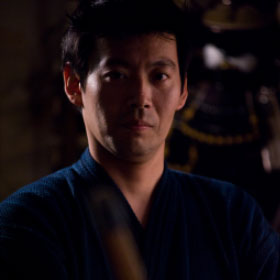Need Kendo Instructions?
You Got It!
You Got It!
Why many good strikes are not valid to shinpan?
by James
(Indiana)
Hello, I have been practice Kendo for several months now but sometimes it is difficult for me to understand the shinpan's judgment. What bothers me most is many strikes look really nice to me but are not valid to the shinpan. I have some examples here:
In the youtube video "2009 All Japan Kendo Championships - Quarter-Finals - Harada vs. Takasaka" by KendoWorld, at 8:33 the guy with red tasuki tried to tsuki and the white tasuki guy blocked with right hand and counterattacked successfully; however the shinpan didn't think so.
And also a nice do strike from "2009 All Japan Kendo Championships - First Round - Shodai vs Oishi" at 1:52 did not count.
Please help me
Thanks
Answer: Thank you for your question! You are from Indiana? How come I don't know you? Maybe you are at Purdue Uni?
Anyway, I understand it is very hard for you to understand why some strikes are considered to be ippon and others aren't.
Firstly, you need to remember that merely hitting a target is not really considered to be an ippon. It is a part of it.
Secondly, at the first glance, I thought it was not an ippon. With the video angle it is hard to tell but Harada senshu (with red tashuki and senshu is a competitor in Japanese) took the initiative. It looked deep enough to get it but as you said it was blocked with the left hand (not the right hand). So Takasaka senshu with the white tasuki got stabbed a little bit and then executed a strike. It looked like that to me. It is called “ato-uchi” and it is considered not a good strike. Ato means “later or after” so ato-uchi means you execute a strike after you actually got struck.
Thirdly, the men strike by Takasaka senshu was shallow. And additionally, because Harada senshu took the initiative when Takasaka senshu stopped a little bit, Takasaka senshu's reaction was not very spot-on.
It is very hard to see. You are watching All Japan Championships with your 7-months of kendo experience. It is very hard to know what is going on. Sometimes it is
About the do strike the other video: It was shallow. By its sound, I think Shodan senshu hit the bottom of the do. But it is the sound of the video so I am not sure. That is my first impression anyway. And you should pull back your shinai after striking hidari-do. But he was going forward. It doesn't look like a proper zanshin to me.
But these are my guess and probably I can keep going a bit more if I try to FIND why these strikes were not considered as ippons.
Plus these shinpan are 8-dan. They know a lot better than us. And this is one of the highest kendo tournaments in the world so they cannot get an ippon that easily.
The important thing is that you go out there in a shiaijo and do what you can, right? And after all, these referees are there for you to convince them that your strikes are good enough.
I personally don't really look at referees when someone got an ippon. You can tell, right? Sometimes you should look at them to make sure which one they thought got the target when both competitors executed the same technique at the same time like ai-men.
You might think you got it but your referees might not agree. You and your opponent have the same referees. So something in your strike didn't look right to your referees. Sometimes referees know what didn't look right, but sometimes they don't. They thought your opponent got it. The same thing happens to your opponent too. The referees might think you got it but you know you didn't.
The more advanced you get, the more complicated kendo gets. But that is why it will be more fun. For now, you enjoy your kendo. Don't worry about who gets an ippon when you are at 7 months old in kendo.
If you are young, train hard following the basics. You will get the firm foundation of kendo. Then you learn all kinds of techniques. You will have such a fun and you will love it!
Good luck!
